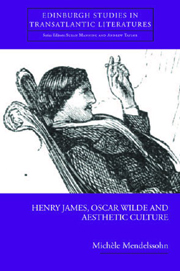Book contents
- Frontmatter
- Contents
- Acknowledgements
- List of Abbreviations
- List of Figures
- Dedication
- Introduction
- 1 ‘I Have Asked Henry James Not to Bring his Friend Oscar Wilde’: Daisy Miller, Washington Square and The Politics of Transatlantic Aestheticism
- 2 The Gentle Art of Making Enemies and of Remaking Aestheticism
- 3 The School of the Future as well as the Present: Wilde's Impressions of James in Intentions and The Picture of Dorian Gray
- 4 ‘Wild Thoughts and Desire! Things I Can't Tell You – Words I Can't Speak!’: The Drama of Identity in The Importance of Being Earnest and Guy Domville
- 5 Despoiling Poynton: James, the Wilde Trials and Interior Decoration
- 6 ‘A Nest of Almost Infant Blackmailers’: The End of Innocence in The Turn of the Screw and De Profundis
- Bibliography
- Index
4 - ‘Wild Thoughts and Desire! Things I Can't Tell You – Words I Can't Speak!’: The Drama of Identity in The Importance of Being Earnest and Guy Domville
Published online by Cambridge University Press: 12 September 2012
- Frontmatter
- Contents
- Acknowledgements
- List of Abbreviations
- List of Figures
- Dedication
- Introduction
- 1 ‘I Have Asked Henry James Not to Bring his Friend Oscar Wilde’: Daisy Miller, Washington Square and The Politics of Transatlantic Aestheticism
- 2 The Gentle Art of Making Enemies and of Remaking Aestheticism
- 3 The School of the Future as well as the Present: Wilde's Impressions of James in Intentions and The Picture of Dorian Gray
- 4 ‘Wild Thoughts and Desire! Things I Can't Tell You – Words I Can't Speak!’: The Drama of Identity in The Importance of Being Earnest and Guy Domville
- 5 Despoiling Poynton: James, the Wilde Trials and Interior Decoration
- 6 ‘A Nest of Almost Infant Blackmailers’: The End of Innocence in The Turn of the Screw and De Profundis
- Bibliography
- Index
Summary
On 2 February 1895, Henry James wrote his brother William to describe the opening night of his play, Guy Domville. Too nervous to attend the performance, James had instead gone to the Haymarket to see Oscar Wilde's An Ideal Husband. He described his dramatic confrontation with Wilde as an awakening that had come too late:
I sat through [An Ideal Husband] and saw it played with every appearance (so far as the crowded house was an appearance) of complete success, and that gave me the most fearful apprehension. The thing seemed to me so helpless, so crude, so bad, so clumsy, feeble and vulgar, that as I walked away across St James's Square to learn my own fate, the prosperity of what I had seen seemed to me to constitute a dreadful presumption of the shipwreck of Guy Domville; and I stopped in the middle of the Square, paralysed by the terror of this probability – afraid to go on and learn more. ‘How can my piece do anything with the public with whom that is a success?’ It couldn't – but even then the full truth was, ‘mercifully,’ not revealed to me; the truth that in a short month my piece would be whisked away to make room for the triumphant Oscar. (L3 514)
Guy Domville was replaced by The Importance of Being Earnest at the St James's Theatre on Valentine's Day, 1895. In March Wilde was arrested. In April he was tried. In May he was sentenced to two years' hard labour at Pentonville.
- Type
- Chapter
- Information
- Henry James Oscar Wilde and Aesthetic Culture , pp. 163 - 196Publisher: Edinburgh University PressPrint publication year: 2007

